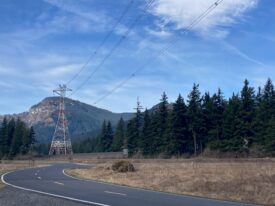As warm spring weather arrives, I’ve found myself wanting to read less but hear and experience more. In that spirit, I offer a recommendation for the work of Portland radio documentarian Barbara Bernstein, who continues her vital work telling stories about the fight against fossil fuels. In an era of hot takes and short attention spans, Barbara’s treatments are refreshing for their depth, thoughtfulness, and pace.
I’ve had the honor of being featured in several of Barbara’s recent projects on KBOO community radio, including two audio profiles and one video webinar. So, for Sightline readers interested in digging deeper into the Thin Green Line—and taking a break from reading too—please enjoy these three resources:
- Celebrating the Thin Green Line: An Earth Day Special is something of a retrospective, looking back on a decade of successful opposition to dirty energy projects in the Northwest, with a special emphasis on the big coal export fight in Whatcom County. In this episode, I’m joined by Lummi Nation leader Jay Julius, who describes the essential role that Northwest tribes have played in protected their sacred resources. Jay is a powerful storyteller who upholds his Xa xalh Xechnging (sacred obligation) by continuing to empower Native leadership, and to advocate for the Salish Sea. He has served as Chair of, and on Council at, Lummi Nation; has organized and executed Tribal, local, regional, and national campaigns; and has working relationships at all levels of government.
- Winds of Change in Appalachia explores that region’s rocky transition away from coal as a comparison study to the Northwest. West Virginia, which is suddenly at the center of the nation’s political debate about climate, exemplifies the choice now facing the Ohio Valley. One option is to double down on fracking, continuing to build out countless miles of pipelines, and hoping for petrochemical developments to create a market for more gas and its derivatives. The other option is to follow the lead of a growing network of activists who envision a different future, where prosperity derives from building new infrastructure like broadband internet and clean energy resources, and where paychecks come from restoring the region’s aging mines, drilling wells, forests, and streams. In this episode, I’m joined by Ted Boettner with the Ohio River Valley Institute and Reimagine Appalachia.
- Celebrating the Thin Green Line: a webinar with leading activists tells the story of more than the long fight in Northwest communities that faced off against proposals to build giant coal, oil, and fracked gas projects from southern Oregon to the Salish Sea.
Now, in 2021, most of these projects have been canceled, and the rest are in the throes of death. The webinar features key actors in the Thin Green Line movement who share their stories about how their victories were won and what challenges remain ahead. I was very pleased to be featured alongside an all-star team of activists: Jay Julius with the Lummi Nation; Klamath-Moduc artist and activist Ka’ila Farrell Smith; Longview, Washington activist Diane Dick; Elijah Cetas with the Braided River Campaign in Portland; and Claudia Riedener with Redefine Tacoma.










Eric Kuhner
It’s a worthwhile exercise to point out the inconsistency in subsidizing investment in capital equipment that undermines long-term climate goals. But eliminating that subsidy is low-hanging fruit: it merely makes consistent policy and seems unlikely to advance the underlying, more challenging goals you lay out: “…freeing up millions of dollars for equity-enhancing weatherization programs or even possibly gas-to-electric appliance conversions for existing gas customers.” Many, arguably most, gas customers faced with a choice of upgrading aging equipment to more efficient appliances or converting to heat pumps (which we know is the only efficient electric alternative) will still stick with gas, either stretching the life of old equipment or choosing the alternative with lower up-front cost (new gas equipment). IMO, the elimination of subsidies won’t change the underlying economics, only the rate of adoption. The dollars diverted by the proposed policy change could be used for anything; how do we actually incentivize the underlying goals?
There might be some clues in past policy: in the 1990s, there was an actual utility subsidy (in Washington, possibly Oregon as well) to encourage conversion of electric heat to gas. The underlying theory was that expansion of electricity supply was expensive, and burning gas for heat at the point of use is much more efficient than burning gas to generate electricity (then subject to line losses) and using resistance heat. The target here was electric resistance heating and the avoided cost of grid and generation expansion. (The policy was at least half-right but short-sighted.)
I don’t recall details of the politics behind the policy that allowed (or forced) electric utilities to accept publicly subsidized loss of a customer base. This was in the era of decoupling and least-cost energy planning, when load reduction through efficiency (and in this case, elimination) was viewed equivalent to generation (without factoring in net greenhouse gas emissions over equipment lifecycle, especially with the greening of the grid). Of course, the goal envisioned was never elimination, or even reduction, of overall electricity demand, merely reduction in the rate of growth. The question remains: is there some way that gas utilities might be incentivized to underwrite the reduction of their customer base? It begs a restructuring of the entire utility sector, with gas customers absorbed into a broader utility customer base where utility entities (public or private) can begin to be agnostic about customer energy choices. (How else to get gas companies to leave resources in the ground?).
It also seems a little disingenuous to toss off the phrase, “…equity-enhancing weatherization programs.” Forgive me for stating the obvious, but utility incentives for weatherization are still largely regressive due to the proportion of lower-income households who are renters and the mismatch in rentals between costs (which are borne by property owners) and benefits (which are received by end customers, generally tenants). It’s an endemic problem with utility-centered programs (without even getting in to the challenges for low-income homeowners) and a big reason most low-income weatherization programs are government or not-for-profit. I’d like to say I have an answer, but having raised the issue, I’d love to hear your thoughts (beyond simply focusing on utility incentives for new construction).
I hope you will pursue this line of thought with respect to energy incentives and policy. The goals you raise are important ones, but little advanced by the proposed changes in policy language.
Laura Feinstein
Hi Eric,
You make some good points. This policy idea isn’t going to solve the major problem but I believe it better aligns the state’s policies with the state’s goals. We don’t gain anything toward our carbon reduction goals by allowing pipeline expansion and new investment in natural gas systems.
There was a bill last year and the the year before for a policy called “beneficial electrification” that would allow electric utilities to incentivize gas to electric conversions. It is likely to have a third appearance in the 2022 session and hopefully will pass, opening the door for the public utilities like Seattle, Tacoma and SnoPUD to start electric conversion programs. One thing that might motivate gas companies to reduce customers is the upcoming cap and trade program passed in WA’s 2021 legislative session. Gas utilities are doing a lot of hand waving and promising great carbon reductions with RNG and hydrogen but when they are really forced to make the reductions with the cap and trade program, I think they’ll need to look well beyond those alternative gaseous fuels. In the meantime, I’m all for “death by 1000 cuts” to the gas industry and this is just one of those “cuts”.
Scott Walker
Fine article, except for its premise being faulty:
“prevailing theme: ‘electrify everything.’ That’s because electrification is the cheapest option for the region to meet its aggressive emissions-reduction goals.”
Without breaking a sweat, the data clearly shows that GHG emission are predominantly from our transportation system. Though transitioning transportation to be fueled electrically will somewhat reduce our GHG, the lowest hanging fruit will be from transitioning our transportation system to walking, biking and excellent transit. I don’t know the statewide data, but here in Jefferson Co., 66% of our GHG emission are from driving, so theoretically, we could reduce our GHG emissions close to 66%. Do the math for your county and then clearly see that we CAN drastically reduce our statewide GHG by transitioning away from personal transport within a very short time. Sadly, electrifying our transport system will serve to further enrich those who already own our culture and won’t actually MULTI-solve the many issues caused by our car-oriented culture, GHG emissions only one of the many. In addition, I know you all at Sightline know better than your article. Lastly, the key to a less car-oriented culture is eliminating the subsidy parking policy gives to driving. As, Donald Shoup states, free parking is the fertility drug for cars.
Don Steinke
Thanks Laura. I’ll forward this to relevant legislators in WA.